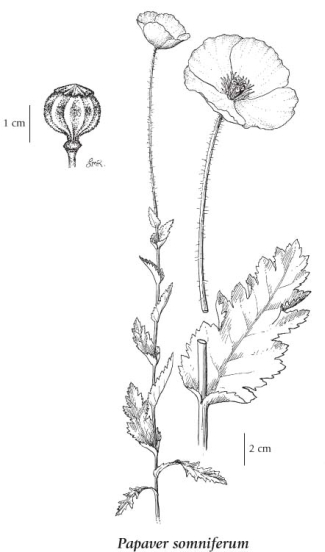Papaver somniferum L.
opium poppy
Papaveraceae (Fumitory family)
Introduction to Vascular Plants
opium poppy
Papaveraceae (Fumitory family)
Introduction to Vascular Plants
Introduction
Opium poppy is an introduced species in North America that originates from southeastern Europe and western Asia. It it a widely grown garden and food plant that has naturalized across the US and Canada (BC, MB, NB, NF, NS, ON, QC, SK) (USDA 2010). In BC, 'wild' plants are reported from several locations, including Vancouver Island and the Queen Charlotte Islands. This is a distinctive annual herb from a taproot with solitary papery white, pink or or purple flowers and nodding flower buds. Basal leaves are lacking or fall off early in the season. Capsules are hairless and round. The tiny seeds spread easily in the garden and escape is common. This species has been described by Randall (2007) in the Global Compendium of Weeds as an "agricultural weed, casual alien, cultivation escape, environmental weed, garden thug, naturalised, noxious weed".
The seeds of the opium poppy are harvested from dried seed pods for use as an ingredient in many foods, and they are pressed to yield poppyseed oil. In the UBC herbarium, there is a single specimen record from "west of Sechelt", where it was collected along Route 101 by Gerald Straley in 1977. |
Species Information
General:
Annual herb from a taproot; stems erect, simple or branching, grey-green, 30-100 cm tall.
Leaves:
Basal leaves lacking or few and soon deciduous; stem leaves oblanceolate, unstalked, the bases heart-shaped and clasping, shallowly lobed, toothed and wavy-margined, 5-30 cm long.
Flowers:
Inflorescence of solitary, terminal, erect flowers; buds nodding; the flowers stalks appressed-hairy; petals 4, white to purple or rose, often with a pale to dark basal spot, 2-6 cm long.
Fruits:
Capsules, nearly round, smooth, 2.5-5 cm long.
Illustration

If more than one illustration is available for a species (e.g., separate illustrations were provided for two subspecies) then links to the separate images will be provided below. Note that individual subspecies or varietal illustrations are not always available.
Illustration Source: The Illustrated Flora of British Columbia
Habitat and Range
Mesic to dry roadsides and waste places in the lowland, steppe and montane zones; rare in SW and SC BC; introduced from Eurasia.Status Information
Synonyms
Synonyms and Alternate Names:
Papaver somniferum var. setigerum auct. non (DC.) Corb.